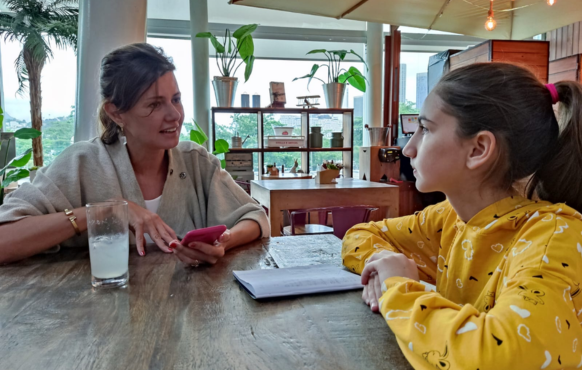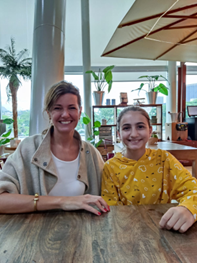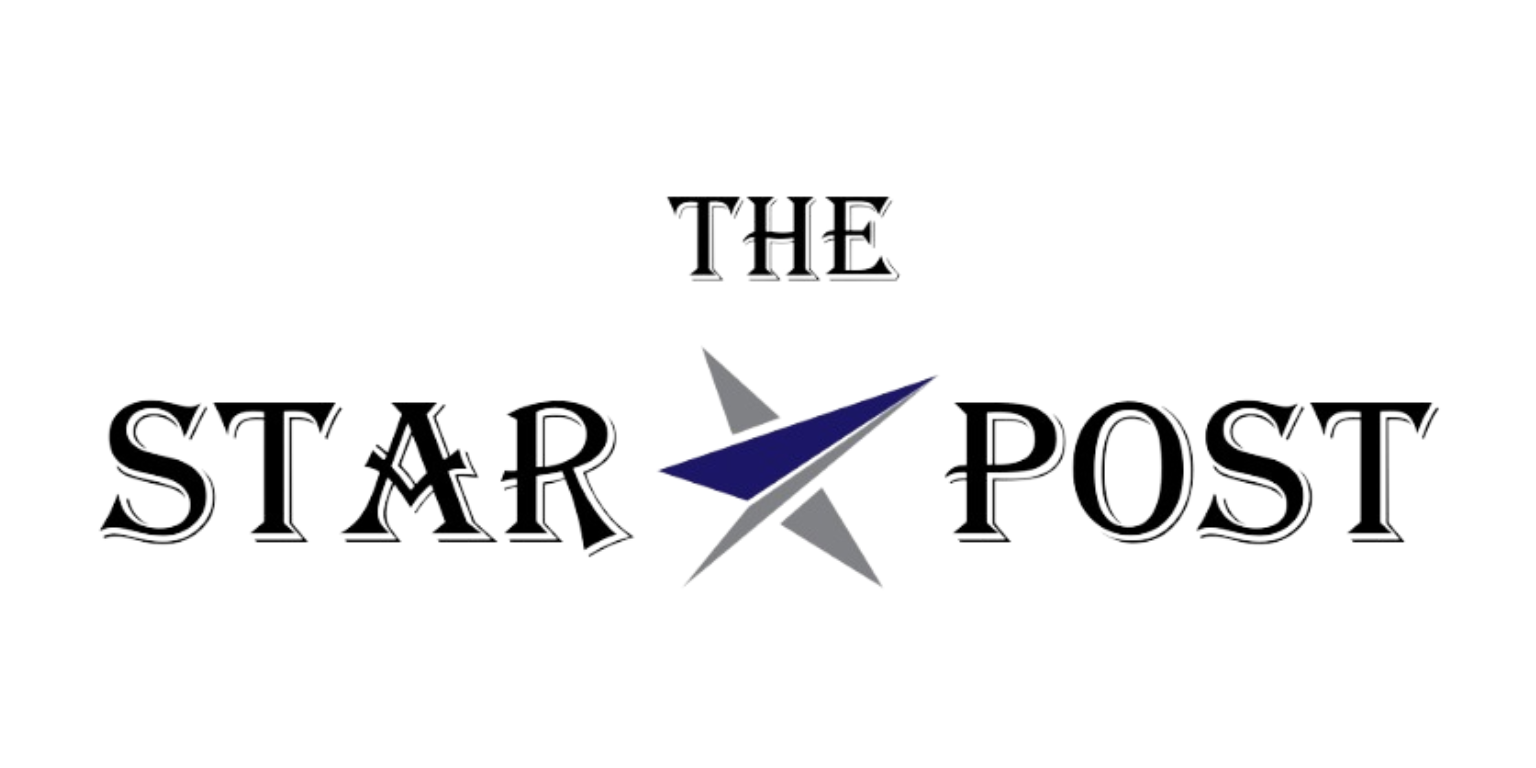
Maria Eduarda Macieira interviewing Tathiana Colturato - Photo: Alexandre Macieira
By: Maria Eduarda Macieira (Grade 3)
Do you know what Circular Economy is? Well, it is a type of economy that looks around the world in a different way, always concerning the protection of the environment. So, people that work on this topic identify the environmental problems and find solutions, involving sustainability and making a great and green economy for the society.
Today, we will learn more about it and you will meet Tathiana, who is a project program coordinator who works with the European Union and also in the project CPAP (Circular Plastics in the Americas Program).
Tathiana Almeida Colturato is 42 years old and graduated in oceanography. Let’s find out how she conquered her actual job. Well, when she was young, she studied a lot and was a very good student. She was good at writing and loved to make something that was good not only for her, but also for the world. So, Tathiana studied oceanography because she was always focused on the protection of the ocean. Then, she went on studying abroad, getting good opportunities, studying a lot and going to universities. She got a scholarship to study abroad, so she did her master program. It was a consortium of several universities. At that place, Tathi understood the relevance of this whole topic and the role she could have to make the difference.
I interviewed Tathi about many cool topics related to sustainability, Circular Economy and her job. Well, we know that our world is having many problems because of pollution, for example, caused by our actions. If we use metal bottles instead of plastic ones, we can avoid animal death, for example. That is to say, society as a whole is related to these problems.
Tathi thinks that it’s very important to have everyone participating in actions that happen all over the world. “Because it’s not a concern that’s only for one country, nation or person. We are sharing the world, and everyone must take part, even though we have different responsibilities. But getting the solution to this and fighting against it, is something that involves everyone”, she said.
The specialist talked about the objectives of the European Union within these actions. “Well, the objective of the European Union toward the Circular Economy is based on the European Green Deal, that sets the basis for new ways of developing. The plan guiding the Circular Economy project as a global project, is called the Circular Economy Action Plan”, she complemented.
CPAP is a project that involves many actions related to a good Circular Economy, with less use of plastics and more sustainability. The project works in some specific sectors, such as: agriculture, textile industry and more. Tathi talked a little about these factors and about the CPAP projects and actions.
“We are now implementing an overall training, that it’s a capacity building program for the federal government. When we talk about policy making, we are affecting all sectors as a whole, so we are improving all issues. Because, beyond all these sectors, we have a cross-cutting issue. So, how could different works improve their process?”, she added.
And that’s what they’re bringing to the government: policy support, making it in a way that they can support all the sectors in others that could be even more relevant for Brazil. So, they are starting now with a seminar and, from October until December, they will be promoting four sessions. They’re called Circular Talks, with policy makers discussing different themes.

Tathiana Colturato and Maria Eduarda Macieira - Photo: Alexandre Macieira
Well, an interesting topic is the interest of the European Union on the implementation of CPAP in Brazil. Tathiana thinks that, concerning plastic, the EU’s main goal is reducing pollution. “We know that plastic is a long-life material that is polluting our oceans and ecosystems everywhere. Now, we need to find a way of avoiding overproduction and reducing consumption. So the main interest behind the Circular Plastics in the Americas Program (CPAP) is understanding how we could mobilize actors to find the solutions. So we mapped the challenges and implemented some activities, working on policy and making innovative solutions, new business models, communication and engagement”, she said.
Do you know the importance of having sustainable projects? The specialist Tathiana thinks that when you are implementing a project, it brings concepts and directives into a specific reality. “We mobilize stakeholders around the topic, we raise awareness around it and that’s based on specific outputs. Because we know exactly what we would like to improve and achieve. And then, that’s an opportunity to bring all together into the same goal. So you know exactly what you want to reach, so it’s focused on plastic, or another sector that’s important for the circular economy, such as: textile and electronics production. So, we focus on targets, and then we implement projects, define goals and mobilize partners based on that”.
Now, thinking about jobs related to the sustainability and environment area, how do they help the society to have a better world? Do you know anyone that works in this type of area? Tathi, as someone that works with this, thinks that it’s really important to have people working on that, because those people are the ones who make the difference and change the world. “And when we focus in different areas, on technology, specific projects, conservation, you’re building this. We are going to make the change, so we engage more, communicate more, so we make this come true.”
Tathi talked a little about her job too, saying some characteristics, difficulties and details. She thinks her job is a way of connecting people to a single objective. Currently, as already cited, she is a project program coordinator. “A program involves a set of different projects that are guided by the same objective, in this case, reducing plastic pollution and improving plastic circularity, circular economy in this value chain. So, I’m connecting people, bringing concepts of international policy and European Union policy, improving and empowering the discussion, bringing good cases and concepts”.
Tathiana said that there are many difficulties in her job that could be seen as challenges. “We must really understand that it is difficult, but it is part of our job. We need to convince people, we need to show people that we have value doing this. We have, sometimes, some specific barriers, like some bureaucracies involved, levels of policies. I think getting out of the box is more challenging, making people think ahead”, she added.
Now, after thinking and learning all about this great topic, how do you think that we can implement the Circular Economy in our country? Tathi divided this into steps. For her, the first step for a good Circular Economy in Brazil is creating a policy, having a guide line for the developing of the market. “We are now discussing in Brasilia the Green Deal of Brazil, and how we are going to do this transition. So, the first topic is really about policy, and based on this guidance, we’ll support industry, commercy services, education and the whole transformation”.
And you? How can your little acts help the world to have a good environment and a sustainable planet?
Compartilhe esta matéria:
Retornar ao


